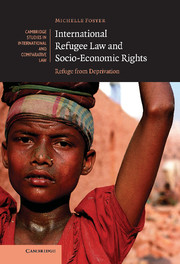Book contents
- Frontmatter
- Contents
- Acknowledgements
- Table of cases
- Table of treaties and other international instruments
- List of abbreviations
- 1 Introduction
- 2 A human rights framework for interpreting the refugee convention
- 3 Persecution and socio-economic deprivation in refugee law
- 4 Rethinking the conceptual approach to socio-economic claims
- 5 Economic deprivation as the reason for being persecuted
- 6 Economic disadvantage and the Refugee Convention grounds
- 7 Conclusions
- Bibliography
- Index
- CAMBRIDGE STUDIES IN INTERNATIONAL AND COMPARATIVE LAW
3 - Persecution and socio-economic deprivation in refugee law
Published online by Cambridge University Press: 21 July 2009
- Frontmatter
- Contents
- Acknowledgements
- Table of cases
- Table of treaties and other international instruments
- List of abbreviations
- 1 Introduction
- 2 A human rights framework for interpreting the refugee convention
- 3 Persecution and socio-economic deprivation in refugee law
- 4 Rethinking the conceptual approach to socio-economic claims
- 5 Economic deprivation as the reason for being persecuted
- 6 Economic disadvantage and the Refugee Convention grounds
- 7 Conclusions
- Bibliography
- Index
- CAMBRIDGE STUDIES IN INTERNATIONAL AND COMPARATIVE LAW
Summary
[T]here are many more subtle ways of persecuting people than beating them up. Many refugees would probably rather suffer an occasional beating than face a life of repression, poverty and disadvantage because of their ethnic or religious background.
Submissions of counsel, Canadian RPD decision, 2000.With respect to education, it seems clear that if a person will be excluded from institutions of learning in his home country for political reasons, this will affect his whole life much more profoundly than a relatively short term of imprisonment.
Atle Grahl-Madsen.Introduction
The question whether a person has a well-founded fear of being persecuted is central to the refugee status determination procedure and is thus an issue on which there is a great deal of jurisprudence and scholarly comment. As explained in Chapter 2, since there is no definition of ‘persecution’ contained in the Refugee Convention, its meaning must be divined by a process of judicial interpretation. The need for some objective guidance has underpinned the development of the human rights approach to interpreting the Refugee Convention, which is now dominant in the common law world, and increasingly accepted in many civil law jurisdictions as well. This chapter explores the extent to which this approach does and can accommodate claims based on the deprivation of economic and social rights.
The notion that persecution may take an economic form is not a modern construct or radical notion; rather there is evidence that from the earliest days of its operation some types of socio-economic claims were considered to fall within the purview of the Refugee Convention definition.
- Type
- Chapter
- Information
- International Refugee Law and Socio-Economic RightsRefuge from Deprivation, pp. 87 - 155Publisher: Cambridge University PressPrint publication year: 2007



